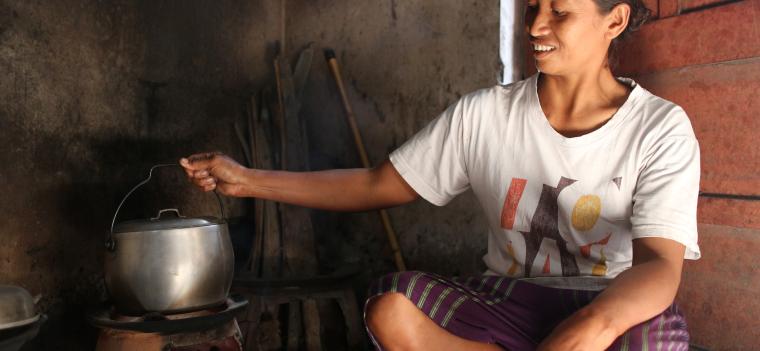News
- In December 2020, ESMAP published the third edition of the RISE report, RISE 2020: Sustaining the Momentum. This third edition measures policy progress in 138 countries on renewable energy, energy efficiency, electricity access, and access to clean cooking.
- ESMAP hosted a deep-dive webinar on February 3 to provide an in-depth understanding of the clean cooking pillar and to discuss opportunities for using the data and key findings generated from the report.
In December 2020, ESMAP published the third edition of the RISE report, RISE 2020: Sustaining the Momentum. This third edition measures policy progress in 138 countries on renewable energy, energy efficiency, electricity access, and access to clean cooking. The inclusion of a full pillar on clean cooking in this edition is significant, as it is the most often overlooked element when it comes to energy policy making.
Given this important addition, following the launch of the RISE 2020 report in January, ESMAP hosted a deep-dive webinar on February 3 to provide an in-depth understanding of the clean cooking pillar and to discuss opportunities for using the data and key findings generated from the report.
The webinar, chaired by Sudeshna Banerjee, Practice Manager for East Africa in the Energy and Extractives Global Practice of the World Bank, included presentations from the RISE team and panel discussions with government officials from Ethiopia, Kenya, and Nepal—as well as private sector representatives from Bboxx and BURN manufacturing. More than 70 attendees around the globe tuned in to join the discussion.
The government officials who participated represented countries that are categorized in the RISE report’s “green zone,”—that is, the top third of countries worldwide with advanced policy and regulatory frameworks for clean cooking. Temesgen Tefera, National Programme Manager for National Biogas Programme of Ethiopia (NBPE) noted, “The RISE report findings are important because our decision makers can use this research and information to bring more attention to the clean cooking sector.”
Indeed, all three government representatives confirmed that the main challenge of pushing forward the clean cooking agenda is its lack of priority in the overall policy framework. “We have the National Energy Policy that—among other things—also talks about cooking, but not in very explicit terms, which means the policy is still deficient in the sense that does not address the specific concerns on cooking,” said Paul Mbuthi, Deputy Director of Renewable Energy at the Ministry of Energy in Kenya. He continued, “But we believe that going forward, we need to now look at dedicated policies addressing the cooking space because we think that is an important aspect.”
Moreover, the disparity in the quality of cookstoves has been a major issue that discourages consumers. Madhusudan Adhikari, Executive Director of Alternative Energy Promotion Center at Ministry of Energy, Water Resources, and Irrigation in Nepal, mentioned that Nepal has developed testing facilities and national standards—recently mandating that all biomass stoves made and sold in Nepal be tier 3 or above on 6-tier scale that determines performance using indicators measuring efficiency, emissions, safety and durability. The Kenyan government has also put forward standards for improved cookstoves and domestic biogas cookstoves, and the government is confident that the country is on the right track in terms of ensuring the market receives products that are of acceptable quality.
Subsidies and tax exemptions were also discussed in depth. Private sector representatives from Bboxx and BURN manufacturing shared their perspectives on the policy environment. “How stable these tax exemptions will be over the long term is very important for private companies because we need to make sure that we have the right input into our business lines,” said Tessa Lee, Global Head of Policy and Government Engagement of Bboxx. Peter Scott, CEO of BURN Manufacturing, also emphasized the importance of providing subsidies for rural households in Sub-Saharan Africa due to the gap between stove prices and consumers’ willingness to pay.
How to combine climate finance and results-based financing was also discussed towards the end of the panel. Yabei Zhang, Lead of the Clean Cooking Fund at ESMAP, mentioned that the Clean Cooking Fund (CCF) is collaborating with the World Bank’s Carbon Initiative for Development (Ci-Dev) in Rwanda through the EAQIP project, the first CCF co-financed World Bank project and the largest clean cooking operation in Africa. Ci-Dev expects to purchase carbon emissions reductions from CCF-funded results-based financing interventions and the carbon revenue will then be used to help more households gain access to clean cooking.
Policy plays a critical role for building an enabling environment for clean cooking market development. All speakers emphasized the importance of concerted effort and collaboration across sectors and countries. RISE is an important tool for policymakers to compare national policy frameworks for sustainable energy and to identify opportunities to attract investment. “Essentially, it is the government that will develop policies, regulations, programs to enable the sector growth,” emphasized Yabei.
She added, “The government’s market-shaping role is particularly important for the cooking sector because the external benefits such as climate, gender, and health associated with clean cooking are not internalized by the market players in their decision making.”
Want to learn more? Please watch our full webinar by clicking here.
